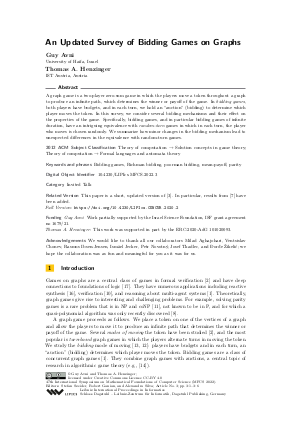An Updated Survey of Bidding Games on Graphs (Invited Talk)
Authors Guy Avni, Thomas A. Henzinger
-
Part of:
Volume:
47th International Symposium on Mathematical Foundations of Computer Science (MFCS 2022)
Part of: Series: Leibniz International Proceedings in Informatics (LIPIcs)
Part of: Conference: Mathematical Foundations of Computer Science (MFCS) - License:
 Creative Commons Attribution 4.0 International license
Creative Commons Attribution 4.0 International license
- Publication Date: 2022-08-22
File

PDF
LIPIcs.MFCS.2022.3.pdf
- Filesize: 0.59 MB
- 6 pages
Document Identifiers
Related Versions
-
This paper is a short, updated version of [G. Avni and T. A. Henzinger, 2020]. In particular, results from [G. Avni et al., 2021] have been added.
- Full Version https://doi.org/10.4230/LIPIcs.CONCUR.2020.2
Subject Classification
ACM Subject Classification
- Theory of computation → Solution concepts in game theory
- Theory of computation → Formal languages and automata theory
Keywords
- Bidding games
- Richman bidding
- poorman bidding
- mean-payoff
- parity
Metrics
- Access Statistics
-
Total Accesses (updated on a weekly basis)
0PDF Downloads0Metadata Views
Abstract
A graph game is a two-player zero-sum game in which the players move a token throughout a graph to produce an infinite path, which determines the winner or payoff of the game. In bidding games, both players have budgets, and in each turn, we hold an "auction" (bidding) to determine which player moves the token. In this survey, we consider several bidding mechanisms and their effect on the properties of the game. Specifically, bidding games, and in particular bidding games of infinite duration, have an intriguing equivalence with random-turn games in which in each turn, the player who moves is chosen randomly. We summarize how minor changes in the bidding mechanism lead to unexpected differences in the equivalence with random-turn games.
Cite As Get BibTex
Guy Avni and Thomas A. Henzinger. An Updated Survey of Bidding Games on Graphs (Invited Talk). In 47th International Symposium on Mathematical Foundations of Computer Science (MFCS 2022). Leibniz International Proceedings in Informatics (LIPIcs), Volume 241, pp. 3:1-3:6, Schloss Dagstuhl – Leibniz-Zentrum für Informatik (2022)
https://doi.org/10.4230/LIPIcs.MFCS.2022.3
BibTex
@InProceedings{avni_et_al:LIPIcs.MFCS.2022.3,
author = {Avni, Guy and Henzinger, Thomas A.},
title = {{An Updated Survey of Bidding Games on Graphs}},
booktitle = {47th International Symposium on Mathematical Foundations of Computer Science (MFCS 2022)},
pages = {3:1--3:6},
series = {Leibniz International Proceedings in Informatics (LIPIcs)},
ISBN = {978-3-95977-256-3},
ISSN = {1868-8969},
year = {2022},
volume = {241},
editor = {Szeider, Stefan and Ganian, Robert and Silva, Alexandra},
publisher = {Schloss Dagstuhl -- Leibniz-Zentrum f{\"u}r Informatik},
address = {Dagstuhl, Germany},
URL = {https://drops.dagstuhl.de/entities/document/10.4230/LIPIcs.MFCS.2022.3},
URN = {urn:nbn:de:0030-drops-168017},
doi = {10.4230/LIPIcs.MFCS.2022.3},
annote = {Keywords: Bidding games, Richman bidding, poorman bidding, mean-payoff, parity}
}
Author Details
Funding
- Avni, Guy: Work partially supported by the Israel Science Foundation, ISF grant agreement no 1679/21.
- Henzinger, Thomas A.: This work was supported in part by the ERC-2020-AdG 101020093.
Acknowledgements
We would like to thank all our collaborators Milad Aghajohari, Ventsislav Chonev, Rasmus Ibsen-Jensen, Ismäel Jecker, Petr Novotný, Josef Tkadlec, and Đorđe Žikelić; we hope the collaboration was as fun and meaningful for you as it was for us.
References
-
R. Alur, T. A. Henzinger, and O. Kupferman. Alternating-time temporal logic. J. ACM, 49(5):672-713, 2002.

-
K.R. Apt and E. Grädel. Lectures in Game Theory for Computer Scientists. Cambridge University Press, 2011.

-
G. Avni and T. A. Henzinger. A survey of bidding games on graphs. In Proc. 31st CONCUR, volume 171 of LIPIcs, pages 2:1-2:21. Schloss Dagstuhl - Leibniz-Zentrum für Informatik, 2020.

-
G. Avni, T. A. Henzinger, and V. Chonev. Infinite-duration bidding games. J. ACM, 66(4):31:1-31:29, 2019.

-
G. Avni, T. A. Henzinger, and R. Ibsen-Jensen. Infinite-duration poorman-bidding games. In Proc. 14th WINE, volume 11316 of LNCS, pages 21-36. Springer, 2018.

-
G. Avni, R. Ibsen-Jensen, and J. Tkadlec. All-pay bidding games on graphs. In Proc. 34th AAAI, pages 1798-1805. AAAI Press, 2020.

-
G. Avni, I. Jecker, and Đ. Žikelić. Infinite-duration all-pay bidding games. In Proc. 32nd SODA, pages 617-636, 2021.

-
C. Calude, S. Jain, B. Khoussainov, W. Li, and F. Stephan. Deciding parity games in quasipolynomial time. In Proc. 49th STOC, 2017.

-
A. Condon. The complexity of stochastic games. Inf. Comput., 96(2):203-224, 1992.

-
A. E. Emerson, C. S. Jutla, and P. A. Sistla. On model-checking for fragments of μ-calculus. In Proc. 5th CAV, pages 385-396, 1993.

-
M. Jurdzinski. Deciding the winner in parity games is in up ∩ co-up. Information Processing Letters, 68(3):119-124, 1998.

-
A. J. Lazarus, D. E. Loeb, J. G. Propp, W. R. Stromquist, and D. H. Ullman. Combinatorial games under auction play. Games and Economic Behavior, 27(2):229-264, 1999.

-
A. J. Lazarus, D. E. Loeb, J. G. Propp, and D. Ullman. Richman games. Games of No Chance, 29:439-449, 1996.

-
N. Nisan and A. Ronen. Algorithmic mechanism design. Games and Economic Behavior, 35(1-2):166-196, 2001.

-
Y. Peres, O. Schramm, S. Sheffield, and D. B. Wilson. Tug-of-war and the infinity laplacian. J. Amer. Math. Soc., 22:167-210, 2009.

-
A. Pnueli and R. Rosner. On the synthesis of a reactive module. In Proc. 16th POPL, pages 179-190, 1989.

-
M.O. Rabin. Decidability of second order theories and automata on infinite trees. Transaction of the AMS, 141:1-35, 1969.

